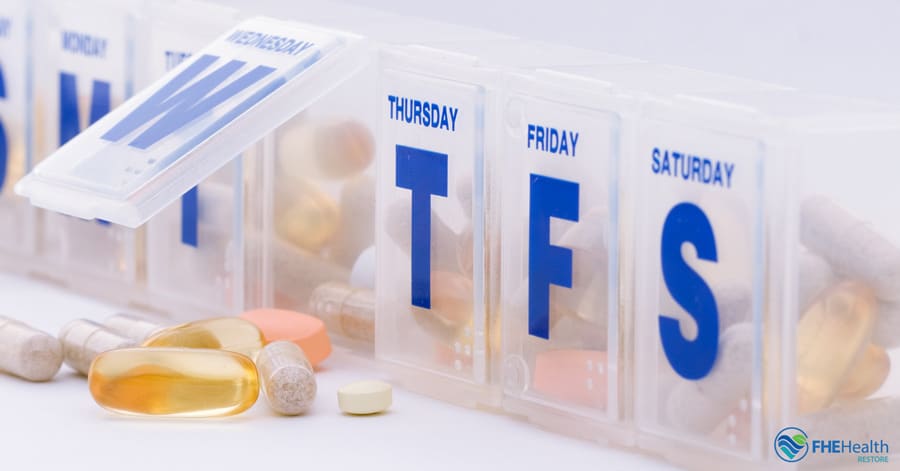Chronic disease may warrant the need for long-term or even lifetime medication use. However, in some cases, it may be possible to reduce or eliminate certain prescriptions.
It’s important to consider a number of factors, such as whether the medication has been prescribed for multiple diseases or preexisting conditions. Always consult a health care professional before making adjustments to your medication.
Risks and Side Effects Associated With Long-Term Medication Use for Chronic Disease
There can be health complications to long-term medication use. American Family Physician reports multiple risks of taking benzodiazepines longer than 1 month, such as falls and fractures, cognitive impairment and car accidents. A long, uncomfortable and possibly dangerous withdrawal period is another possible side effect of using this drug class on a long-term basis. Commonly prescribed benzodiazepines include Valium, Xanax and Klonopin.
Selective serotonin reuptake inhibitors (SSRIs) are commonly prescribed for depression. Some of the drugs in this category include Prozac, Lexapro and Zoloft. According to the National Institutes of Health (NIH), these drugs aren’t without long-term risks either. Extended use of SSRIs may cause sleep problems, weight gain and withdrawal if you try to discontinue the drug. Benzodiazepines and SSRIs can be safely discontinued under a doctor’s supervision.
Concurrent disorders such as simultaneous anxiety and depression may require multiple medications. When these conditions affect one another, known as disease interaction, it can exacerbate their respective symptoms. The presence of anxiety may lead to depression, while a depressed person may find themselves becoming more anxious.
In some cases, mental and physical disorders can coexist. Recent studies have examined comorbidities and COVID-19, as this viral illness may increase risk factors for anxiety and/or depression, even on a long-term basis. WebMD reports that the condition known as Long COVID may in fact increase depression risk, which may lead to taking depression medication long-term.
Lifestyle Changes That May Help Reduce Dependence on Medications
Whether you’re taking medication for co-occurring conditions or a single condition, lifestyle changes may help you reduce or eliminate the need for drug therapy. This is true not only for anxiety and depression but for other conditions as well.
Obesity and diabetes are two physical conditions for which people may take medication on a long-term basis. Just as with every prescription, over-the-counter medicine and supplement, weight loss drugs and diabetes medications aren’t without risks and possible negative side effects. These drugs can be discontinued under a doctor’s care with modifications to everyday habits.
Often, the same lifestyle changes that can help you reduce or stop taking Type 2 diabetes or weight loss drugs may also help anxiety and depression. These changes can be affordable and simple to do. Sometimes, the solution is as simple as having a healthier diet, getting more exercise and taking steps to ensure higher quality sleep.
The Importance of Nutrition, Exercise and Sleep
Now, let’s examine each of these factors in more depth. It’s common knowledge that regular exercise can help you lose weight and build strength and endurance. Most people are also aware of the cardioprotective effects of consistent workouts.
However, what some may not know is that exercise may alleviate depression. Harvard University reports that for some, exercise can be just as effective as antidepressants. Anxiety may also be helped with regular exercise.
If you’re wondering how much exercise it takes to reduce or cut out your medication, there’s no one answer that works for everyone. The CDC recommends 150 minutes of moderately challenging exercise per week to stay fit. However, if you’re just starting out, it’s a good idea to start slow and work your way up to longer, more challenging exercise sessions.
Changing your diet may also reduce the need for medication. For example, certain foods may help ease depression naturally. As with workouts, there are many options when it comes to eating healthier. Rather than deprive yourself of your favorite foods or starve yourself to lose weight, take a balanced approach to nutrition. Aim to fill your plate with nutrient-rich foods, and refer to the current dietary guidelines for Americans when creating a nutritional plan.
The importance of sleep shouldn’t be minimized when developing a plan to cut down or eliminate your medications. The lack of sleep may actually be a risk factor in multiple mental and physical diseases, including Type 2 diabetes, obesity, heart disease and depression. The CDC recommends adults sleep for an average of 7 hours per night to encourage optimal wellness. If you have trouble sleeping, there are natural remedies you can try before reaching for additional medication that could compound your problems.
Working With Health Care Providers to Develop a Plan
No matter what kind of medication you’re taking, it’s crucial to involve health care providers in your discontinuation plan. You may need a team of physical and mental health care providers to successfully reduce or quit antidepressants, anti-anxiety drugs or other medications.
Your care team can instruct you on the best way to discontinue your medication. While you probably want to get the drug out of your system as quickly as possible, a slow taper is usually best. Some drugs can be discontinued abruptly without dangerous side effects, but in most cases, tapering is the method of choice. Regular workouts can speed your metabolism and may help accelerate medication elimination from your system.
Every person’s care plan is different. However, nearly everyone quitting a medication requires regular labs to check various health-related statistics, such as blood glucose and liver function. You may also need or want talk therapy and perhaps other mental health therapies to deal with the emotional effects of medication discontinuation. In addition, these therapies may help treat anxiety and depression without drugs on a long-term basis.
Contact Restore Mental Health
Don’t wait to change your life for the better. Contact Restore Mental Health online or by phone to discuss your medication reduction and wellness goals. Our experienced professionals are here to guide you through the recovery process to a brighter, healthier future.



